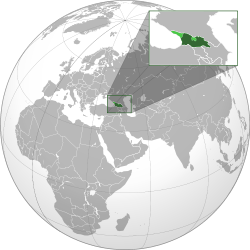Georgia: Debating Prison Reform
By Eurasianet
By Paul Rimple
The need for far-reaching changes in Georgia’s prisons, brought to life by recent graphic videos of rape and beatings, paved the way for Georgian Prime Minister Bidzina Ivanishvili’s rise to power. But now, nearly two months after the parliamentary elections that put his Georgian Dream coalition in charge of the country’s 17 correctional facilities, the topic of prison reform is proving contentious.

For some, the reform procedure is not moving fast enough, while others fear it is moving too quickly and sacrificing transparency along the way. Much of the debate centers around an amnesty bill, now under discussion in parliament, which, according to Prisons Minister Sozar Subari, could release 6,500 of Georgia’s 23,227 prisoners, including some 185 alleged political prisoners.
On November 12, two local non-governmental organizations, the Georgian Young Lawyers’ Association and Article 42 of the Constitution, pulled out of a parliamentary working group, comprising about a dozen non-governmental organizations, that is trying to determine whether or not the 185 prisoners, and an additional 13 wanted individuals, were charged for political reasons. [Both the GYLA and Article 42 receive funding from entities connected to the Soros foundations network. EurasiaNet operates under the auspices of the Open Society Foundations in New York, which is also part of the Soros network].
Representatives of the two NGOs claimed that the two-week period they were given for accomplishing the task was insufficient for each person on the list to receive a full review of his or her case. “Of course, there is a kind of danger that everybody can say they’re political prisoners, but still, we can’t discriminate against those who may be victims,” said Tamar Gabisonia, chair of Article 42 of the Constitution. “We appreciate the government’s intention – being quick is important – but still, the decision must be fair.”
Others feel there is no time to waste. The size of Georgia’s prison population has increased more than threefold since 2004, when President Mikheil Saakashvili first launched his war on crime. At 514 prisoners per every 100,000 people, Georgia’s rate of incarceration is the highest in the South Caucasus, even topping that of jail-happy Russia to the north.
Lawyer Lia Mukhashavria, head of Human Rights Priority, a Tbilisi-based NGO, and a former candidate for the post of ombudsman, argues that 90 percent of Georgia’s prisoners must be released from jail since their convictions were unwarranted. “If no radical changes are tried, the situation will get worse,” Mukhashavria said.
Sozar Subari, the new minister of prisons and a former ombudsman under President Saakashvili, said he is prepared for radical change; the gravity of the situation in the country’s correctional facilities prompted him to request the post of prison minister, he told EurasiaNet.org.
His first test came immediately, early this month, when inmates of Rustavi Prison #16 protested Subari’s appointment of former Tbilisi police chief Levan Aburjania as prison director. A protest at Ksani Prison against Subari’s appointment of Nukri Khukhua, a former deputy prisons minister, as the facility’s director led to a scuffle between protesting relatives outside the prison gates and soldiers guarding the perimeter. Both men later resigned.
Subari alleges that former, unnamed officials loyal to Saakashvili masterminded the disruptions by threatening to blackmail prisoners. But Human Rights Priority’s Mukhashavria, who provides legal counsel to several inmates, scoffs at the allegation as out of touch with the reality of prison life. “You can’t appoint police chiefs as prison directors. You need to consider other professions; like psychiatrists, for example,” she said.
Subari says that his priority is to improve prisoner living conditions. He inherited an overcrowded prison system in which one of his first tasks was to request 5,000 cots from the Ministry of Defense so that each prisoner could have a place to sleep. He claims that 30 percent of Georgian prisoners suffer from Hepatitis B and C, and that many also show signs of mental disorders.
Reportedly, the beatings have stopped, and a more relaxed prison management regime introduced – a process begun under Subari’s predecessor, Giorgi Tughushi. Prisoners are allowed to have cell phones, attend church services, and the 51 members of a prison monitoring group set up under Tughushi can make impromptu visits.
“The atmosphere has changed in a positive way,” commented Siv Fjortoft, a penitentiary and probation expert at the Norwegian Mission of Rule of Law Advisers to Georgia, which works with the Georgian government. Fjortoft added that prisoners now appear more willing to talk with outsiders, “[b]ut there are many prisoners that shouldn’t be there.”
What any of those prisoners will do for work once released from prison is a question that worries human rights activist Ucha Nanuashvili, one of the 51 prison monitors and head of the Tbilisi-based Human Rights Center. The Georgian prison system currently has no rehabilitation programs in place, although plans exist to create one with the help of religious and civil-society organizations.
“The problem will be what to do with thousands of people on the streets – there’s no work,” Nanuashvili noted. “How do you employ them?”
Nonetheless, despite such challenges, optimism runs strong among some prison families that their detained loved ones will get a fair break under the new government.
The parents of 20-year-old Andrew Gelovani, convicted in 2011 for allegedly murdering his best friend, say their son’s appeals hearing in December will be his first chance for a fair trial, and call the former prison system “hell.”
But Gelovani’s mother, Nata, acknowledges that dramatic change in the country’s prison system may take time.
“First, [the government] must establish a just system,” she said. “One month is a short time for changes.”
